Ready to help treat your pet to a healthy life?
Lazy Dog Breeds for Laid-back Lifestyles
By : Trupanion Staff | Updated Apr 17, 2024

All dogs are special, but not every type of dog may suit your particular needs, interests, or preferred way of living. Different dog breeds come with differing attention and exercise requirements, and it's important to find the right fit for your family in order to make sure both you and your canine are able to thrive.
When we refer to certain dog breeds as "lazy," what we really mean are types of dogs that tend to be very easygoing and relaxed. These dogs still require regular exercise of course, but their levels of energy (and corresponding temperaments) are on the noticeably chill side compared to their "less lazy" counterparts.
The fact is that these more spirited breeds (with seemingly endless energy) can be great for young couples and families, but some people just can’t devote hours to wear out an enthusiastic pet’s energy. Plenty of dog breeds are perfectly content to curl up next to you on the couch instead of playing a game of frisbee. Lazy breeds are perfect for elderly people who don’t have the physical ability to vigorously exercise their pet, and for busy families who don’t have much time.
6 lazy dog breeds
If you’re looking for a lazy dog one of these laid-back breeds may be perfect for your family. It's still a good idea (and an important one) to go meet your prospective canine in person first and not base your decision on breed alone. However, this list can be a great place to start if you're looking for one relaxed, easygoing furry friend.
Read through each lazy dog breed to learn about their personalities, energy levels, and common health risks to help better inform your decision.
1. Basset Hound
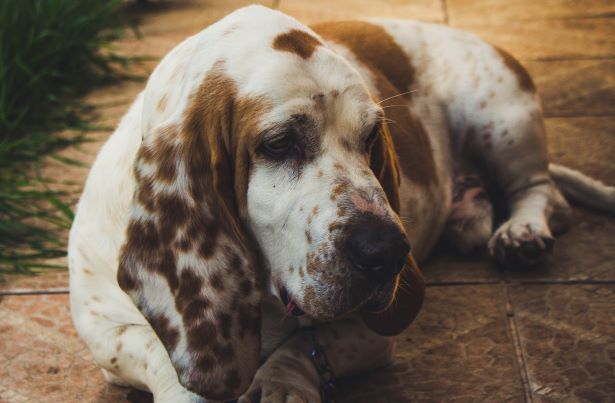
Basset Hounds are easily identified by their soulful eyes, long and droopy ears, and long body with short legs. These large, low dogs are notoriously stubborn and take their good old time when asked to do something, but what they lack in obedience, they make up for in loyalty. They are good with children and get along with most other dogs and cats. Basset Hounds prefer to spend their day snoozing on the couch and will likely howl loudly if expected to stay outside.
The Basset’s length puts it at risk for intervertebral disc disease, which is characterized by bulging or ruptured disc(s) that puts pressure on the spinal cord and can cause pain and paralysis. Other health conditions common to basset hounds include:
- Ear infection
- Gastric dilation volvulus
- Canine hip dysplasia
2. Cavalier King Charles Spaniel

This long-haired beauty is happy to lounge the day away on his owner’s lap. The attentive Cavalier King Charles craves companionship, and when you’re not sharing a La-Z-Boy, he’ll likely be trailing close behind. This small dog has silky, long hair that requires frequent brushing to avoid tangles and mats. At the large end of the toy-breed group, Cavaliers still share several characteristics with tiny dogs, including occasional stubbornness and difficulty housetraining. Overall, Cavaliers make great house pets, and they are smart dogs who learn quickly if you are patient and persistent.
Cavalier King Charles Spaniels are genetically predisposed to mitral valve disease (MVD), which is characterized by degeneration of the mitral valve of the heart. MVD accounts for a significant number of premature deaths, and owners must ensure their pets undergo an annual heart evaluation to monitor disease development. Other conditions common to Cavalier King Charles Spaniels include:
- Luxating patellas
- Syringomyelia
- Seizure disorders
3. English Bulldog
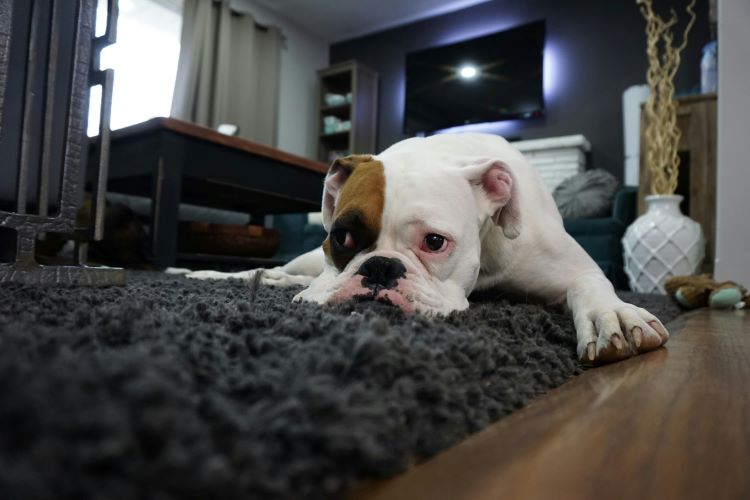
English Bulldogs are affectionate, friendly, calm dogs who can be perfect for a busy family. Their short, stocky, wrinkle-covered body makes them easy to spot. The puppies can be energetic and boisterous, but they quickly mellow to calm adults who rarely bark. English Bulldogs enjoy a walk through the park, but their short, narrow airways cause them to overheat easily, and strenuous exercise should be avoided. High temperatures and humidity can also be dangerous, so never keep your English Bulldog outside or in a house without air conditioning.
English Bulldogs are lovable companions, but they are notorious for a laundry list of health problems. In addition to overheating easily, their shortened airways can cause a group of abnormalities called brachycephalic airway syndrome that can cause breathing abnormalities and respiratory distress. Other health problems common to English Bulldogs include:
- Skin-fold dermatitis
- Allergies
- Hip dysplasia
- Cherry eye
- Reproductive problems
- Dental problems
- Spinal deformities
- Keratoconjunctivitis sicca (i.e., dry eye)
4. French Bulldog
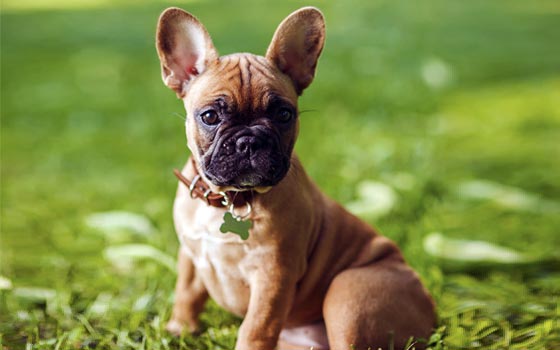
Pint-sized French bulldogs are similar to their larger English counterpart, complete with wrinkled face and short, bow-legged stance. Frenchies are smart, endearing pets, who are quickly becoming one of America’s most popular dog breeds, since they don’t require much room. Their small size and docile personalities make French bulldogs perfect for people who live in small condos or apartments.
French bulldogs are affected by many of the same medical conditions as English bulldogs. Their respiratory system conformation predisposes them to brachycephalic airway syndrome and heatstroke. Females frequently have difficulty giving birth due to the breed’s proportionally large head, and cesarean sections are typically scheduled to prevent dystocia, or delivery problems.
5. Greyhound
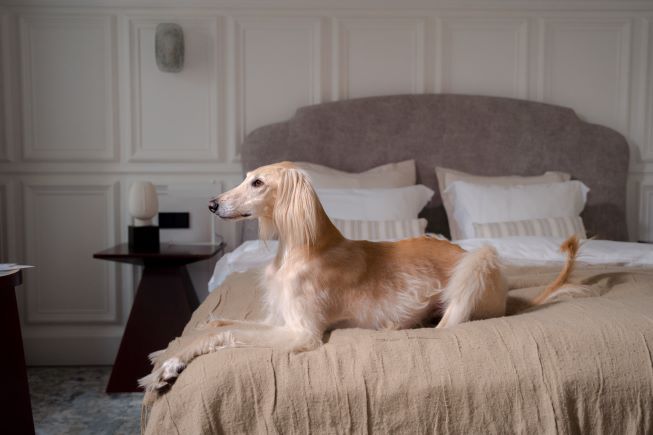
Although Greyhounds are well-known as racing dogs (though that is coming to an end), once they transition into a home, retired racers settle into a couch potato role quite easily. Greyhounds are calm, gentle, affectionate dogs who make great family pets. Their trademark long, lanky frames and dainty heads make them natural sprinters; however, most are content to lounge around the house.
Greyhounds are generally healthy dogs, but they tend to experience a higher incidence of bone cancer than most other breeds. Their deep chest also increases their risk of gastric dilation and volvulus, a life-threatening emergency characterized by stomach distension and twisting that prevents gas release and restricts blood flow.
6. Pekingese
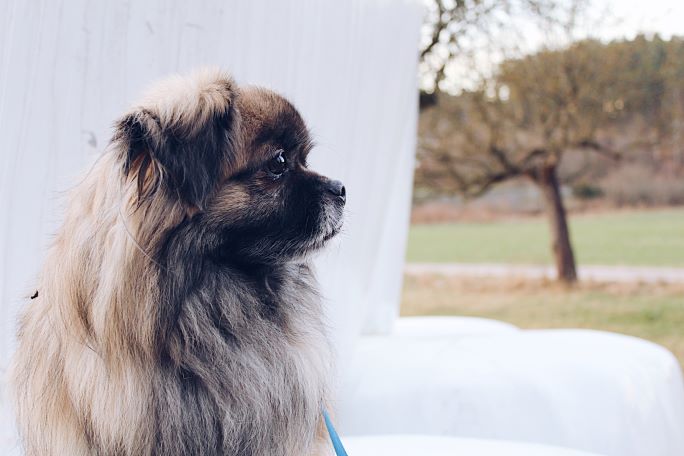
These tiny dogs with a big personality are typically confident and independent, and their flat face, long mane, and rolling gait make them definitely distinctive. Owners should research the breed’s characteristics before bringing a cute, fluffy Pekingese puppy into their home. Pekingese can make wonderful pets for people who are willing to devote extra time to training and who appreciate the breed’s spunky nature. They do fairly well with older children, but will likely be frightened by smaller or rambunctious children.
As flat-faced dogs, Pekingese are also affected by brachycephalic airway syndrome, and are predisposed to heatstroke, intervertebral disc disease, and eye problems.
Is a lazy dog right for me?
Lazy breeds may not beg for your attention daily, but they still need exercise. All dogs need regular exercise to stay healthy and avoid becoming overweight. Lazy breeds may be perfect for people who can’t provide exhaustive exercise, but taking your dog on a daily walk is important, and owners who are unable to exercise their dog should hire a dog walker or use a doggy daycare service to ensure their pet stays healthy and happy. Small breeds can often get their daily exercise by chasing a ball through your house or apartment.
Before welcoming any canine into your family, it's important to take into account all of their needs and be prepared to meet them. Research the breeds you are considering to ensure you select the right pet for your lifestyle. Be honest with yourself about the amounts of energy, time, and dedication you're able (and willing) to put in.
Ultimately, if you are looking for a low-energy dog who will happily laze around your house, any of the breeds mentioned here may fit the bill. While you're getting your home set up for your new pet, make sure they’re protected and learn more about how Trupanion dog insurance can help in the event of injury or illness. After all, even lazy dogs can still get sick or find their way into accidents.
